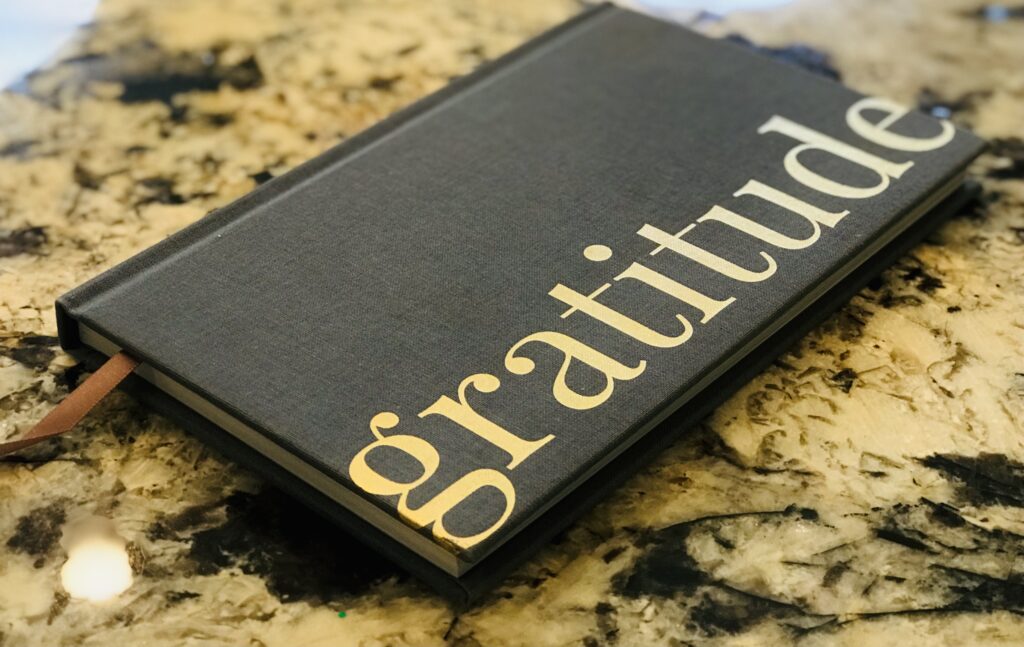
A few years ago, my Bible study group was searching for a Lenten project that would help us cultivate our faiths and grow us closer to one another. One member suggested we begin a shared gratitude practice because her daily gratitude journaling had had such a profound effect on her. “You can’t be grateful and hateful at the same time,” she explained, “this has helped me see the everyday things around me that are gifts and be thankful for them.” Convinced we could similarly benefit, our group embarked on the challenge of keeping a shared Google doc among us where we recorded our gratitudes. Some of us shared daily, some weekly, others only once or twice, but we all agreed the practice of stopping to appreciate people and things that were meaningful to us—from warm cups of coffee and faithful canines to job promotions and healthy biopsy reports— did, in fact, hone our ability to see good around us. We agreed we felt better about the world, about our neighbors, even ourselves. Best of all, we felt we’d grown closer as group. It was a cool experience.
I suppose we shouldn’t have been surprised by the results. Study after study on gratitude shows taking time to be thankful literally changes brain chemistry in a way that can actually boost physical and mental health. The effects occur even when the gratitude practice is private to the practitioner and not shared. Take for example the thank you note study. Study subjects wrote letters of gratitude to someone who had helped them in some way. Some mailed their letters to recipients, some did not. When researchers examined the MRIs of the subjects who actually mailed their notes vs. those who didn’t, they discovered the positive brain chemistry effects in each group was about the same. Just thinking about being grateful had created positive change.
While the science is no doubt fascinating, something in me feels like the study participants who didn’t mail their letters is missing out. Though I’ve kept a personal gratitude practice since the Lenten project, I wondered if I could make it more meaningful. I’ve realized that when my Bible study group shared our gratitudes with one another we not only felt greater contentment and peace, we felt more connected to one another because of the peeks into each other’s daily lives our gratitudes revealed. Then, a friend sent me a gift with the Maya Angelou quote attached: “People will forget what you said, they will forget what you did, but they will never forget how you made them feel.” It was with that in mind that I decided to tweak my gratitude game beyond recording in my journal. While I still regularly list things I’m grateful for, I’ve added a few practices to deepen my gratitude and grow connection to others. Here they are:
Write a Note
Even without an MRI, I can attest to the positive brain chemistry effects of writing a thank you note. Reflecting on others’ kindness toward me stirs my appreciation inside and putting it down on paper is simply therapeutic. Sound hokey? Try it! Think of someone who has helped you in some way or done something kind for you or your family. Write the person and share with them specifically how their action made you feel or what it inspired you to do. Recently, a friend who is a high school coach received a note from a parent that said, “Thank you for spending extra time with my child last week after practice. Your attention to her goals made her feel special and helped her believe that she can be successful in reaching her PR this season.” WOW! Who doesn’t want to know that they encouraged someone and helped them do something possibly life-changing? So don’t keep gratitudes like these to yourself—share away!
Leave a Review
When a friend opened a new business in our town, she posted a request for reviews. I was happy to leave one about her delicious cookies and when I did her husband shot me a text that said “Appreciate your comments. We small businesses thrive on 4 & 5 star reviews and die by the 1’s and 2’s, so thanks!” That inspired me to consider other small businesses I love in our town. Since then, I’ve made it a practice to get on Google maps once a week or so and find places my family frequents and share positive comments. When I have a great server at a restaurant, I try to mention them by name or when a staff person is helpful at the salon I identify them. I’ve been shocked by the response. Often, shoppe owners will message me back to say thank you and tell me how much they appreciate me taking time to write a review. I admit that in the past, I’ve often failed to recognize good service because I simply expect it. But as my health coach says, “rewarded behavior is repeated behavior”, so if we want more good stuff in the world, why not call it out? Show your thankfulness for it, and maybe there will be more.
Share Some Stars
After my husband published his first book last year I became acutely aware of the power of an Amazon review. Like small businesses, the more positive reviews a book receives, the higher it’s promoted through the SEO algorithms. As part of his PR team, I constantly watch the number of stars Brandon’s amassed and contemplate new ways for him to collect more. Now that I’ve realized the importance of reviews to authors, I do my best to leave them for other writers as well. When a book, blog, or article has helped me in some way, I take a few minutes to share my gratitude and thoughts on-line in hopes it helps the author out. You could do the same for podcasts or favorite products you’ve purchased. The point is to share.
Get Social About it
Social media is a common go-to to spotlight good things that happen in our lives, but most times we make it only about us: “Ran my first trail run today and placed third in my age group!” Nothing wrong with a little self-promotion, but consider the power of spreading positivity with a post that says something like, “The race director worked so hard to make today’s 5K awesome! Kudos to the enthusiastic volunteers who got me to the start on time!” While the original is still positive and upbeat, the second blurb is about identifying and saying thanks to a person or community. It takes the focus off ourselves and puts it on others around us.
Do it Yourself
That, in essence is what researchers continually point to as the source of positivity in practicing gratitude: it requires us to think of something other than ourselves and to give thanks. The encouraging thing is that a gratitude practice doesn’t have to be complicated; there are lots of ways to do it. Whether you journal, spend time meditating on things for which you’re thankful, or stuff a jar full of index cards on which you scribble gratitudes, your brain reaps the benefits of practiced positivity. My challenge is why keep all that good stuff to yourself? Practice sharing it! Find ways to sprinkle it into your everyday life—I’m sure there are a million ways to do it. I’d love to hear what you come up with!
